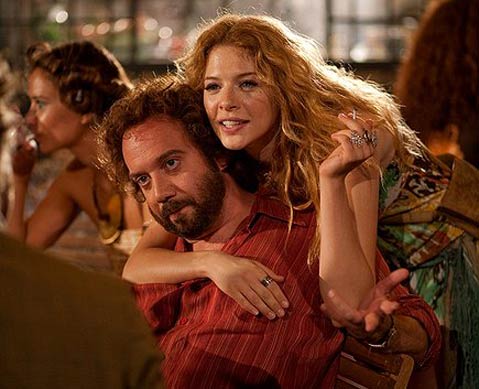Barney’s Version
Paul Giamatti, Rosamund Pike, and Minnie Driver star in a film written by Michael Konyves, based on the novel by Mordecai Richler, and directed by Richard J. Lewis.

Locals take some kind of refracted proprietary pride in the work of Paul Giamatti, thanks to his infamous work as a midlife-crisis–fueled heel tooling around the Santa Ynez Valley in Sideways. In that memorable quirk of a film, he filched money from his hapless mother and went looking for the good stuff—pinot noir-wise—along with an escape from society, and Virginia Madsen. We never really like him, right to the end, and that accounts for the perverse charm of his character as etched through the often darkly humorous lens/pen of Nebraskan auteur Alexander Payne.
Giamatti, who hasn’t had much in the way of good roles since, is up to his higher standards again as another kind of heel in Barney’s Version, a long-haul rogue’s tale. The actor is the best and possibly only reason to check out what is a spottily worthy, but mostly messy construct of a film. Once again, Giamatti masters the art of presenting an unsympathetic character who is not even exactly an anti-hero—still a fairly radical maneuver in a medium that loves its heroes.
Essentially, the premise—based on Mordecai Richler’s novel of the same name—covers an epic swath of time, starting at some late-ish point in the life of our protagonist, a Montreal-based producer for a long-running soap opera, and hurtling back to his swaggering youth in the ’70s. The story meanders its way through the years, hairdos, and drunken searches for self and soul, mostly in vain. Along the way, we get tart and juicy screen turns from Minnie Driver, the ex-wife in the making, and Dustin Hoffman as his salty-tongued ex-cop father. Only the beaming, graceful love of his life, played by Rosamund Pike, serves as an anchor of reason.
Director Richard J. Lewis, whose main work has been in television, makes his film debut here, and he seems somewhat adrift in connecting the narrative dots, keeping a focused tone—satire keeps giving way to melodrama, and vice versa—and generally delivering the goods in a satisfying, cinematic way. By film’s end, the teetering road of memories leaves us motion sick and wanting resolution, or at least a sense that there’s a point to the story. What we’re left with is the Giamatti factor, which ultimately saves the day.



